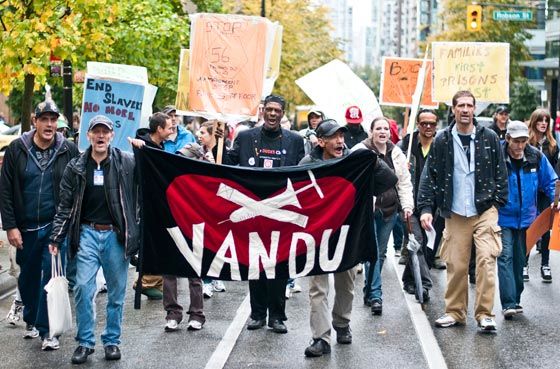
Fighting Capitalism & Colonialism to Heal in Community – Our View on Addiction: By the Editors

How do we soothe human pain? How can we best end the misery caused by isolation and alienation? For this editorial we wanted to focus on how our current environments—both social and physical—create pain, fuel the need for distraction, and produce addiction. When land is stolen, families are torn apart, and people are without homes or constantly displaced; when poverty exists, food no longer nourishes, only the rich have access, and justice feels like a pipe-dream, we seek relief—we seek escape. Capitalism has no room for community, only promotes greed and consumption, and so our experiences of trauma and pain continue.
Punishing our survival
While addiction affects people from all backgrounds, those in working class or low-income communities experience addiction in different ways. For example, people with money can use drugs and alcohol indoors, away from public view, and aren’t forced to interact daily with police, bylaw, social services, and members of the “respectable” public who seek to manage and control their behaviour.
Health is physical, emotional, mental, and spiritual. So is pain. We live in a province where the shamefully-low welfare and disability rates are reduced when people find partners and move in together. Christy Clark punishes low-income people for finding love and companionship. This year, the Liberals clawed back the bus pass for people on disability income in this province. The Province isolates the social lives of low-income people with disabilities, and even interrupts their access to healthcare.
In single-room occupancy hotels and isolated units in social-mix buildings, BC Housing separates people, makes their housing dependent on following rules and meeting conditions because “supportive housing” policies tie low-income access to housing to support for “mental health/addictions.” The assumption is that anyone who lives on the street requires intensive case management. The state breaks up tent cities and squats where people find community, belonging, safety, and purpose in protecting one another from the harms of capitalism and colonialism.
Our fight is witnessing, hearing, and documenting state sanctioned violence in the war on drugs. We know this war is against our people. The communities we live and work in are made up of colonized, racialized, classed, and sex/gender outsiders who the government and dominant society deems undeserving of safety and security. Police respond to property and business owners who perceive the mere presence of homeless people as a threat, and they do nothing when sex workers face real violence. We live in cities where the government creates bylaws that prevent homeless people from staying in one place for too long. We live in communities where anti-poor and drug user hatred is condoned and legitimized. It’s telling when we hear from people who live in Coleman-created tent cities across the Province that their number one wish is to be treated as human.
No healing without ending colonialism
The origin of the violence we all survive is the dispossession of Indigenous people by Canada. And Canada is the violence that Indigenous people survive. The criminalization, institutionalization, regulation, and stigma faced by all low-income people affects low-income Indigenous people the most. This is because Indigenous peoples are also constantly struggling for cultural and national survival inside the colonial state of Canada. Canada was made through the prohibition of languages and ceremonies, the apartheid Indian Act, the (ongoing) “Sixties” Scoop, the foster care system, residential schools, racialized mass incarceration in prisons, and the disappearing and murdering of Indigenous women and girls by settler citizens. All non-Natives in Canada are complicit and benefit (to different degrees) from this ongoing violence. Neither Indigenous nor non-Indigenous oppressed people will begin to heal unless we dismantle this violence of Canada.
Treatment is struggle
We believe that treatment includes treating the human pain that capitalism and colonialism creates. Treatment can look like a lot of different things, but it needs to include recognizing humanity, it needs to include dignity. It needs to combat alienation and the lack of social connection, responsibility, and accountability to our neighbours. It needs to include fighting a system that keeps people in pain and that keeps us consuming to manage that pain. It needs to include the fight against the further destruction of our communities, against displacement, against the dispossession of Indigenous nations that underlies everyday life.
Bud Osborn’s poem, Raise Shit, resonates with our efforts at The Volcano to use words to revolt against the system and create the world we want to live in. We’ll leave you with a portion of his poem.
“…and in our situation in the downtown eastside
the single weapon we wield
like the weapon native indian prophets
like the weapon ancient hebrew prophets
used in situations of vicious displacement
and threatened destruction of their communities
was the word
words against the power
of money and law and politics and media
words against a global economic system…”
